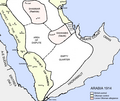Portal:Saudi Arabia
The Saudi Arabia Portal – بوابة المملكة العربية السعودية
Saudi Arabia, officially the Kingdom of Saudi Arabia (KSA), is a country in West Asia and the Middle East. It covers the bulk of the Arabian Peninsula and has a land area of about 2150000 km2 (830000 sq mi), making it the fifth-largest country in Asia and the largest in the Middle East. It is bordered by the Red Sea to the west; Jordan, Iraq, and Kuwait to the north; the Persian Gulf, Qatar and the United Arab Emirates to the east; Oman to the southeast; and Yemen to the south. Bahrain is an island country off its east coast. The Gulf of Aqaba in the northwest separates Saudi Arabia from Egypt and Israel. Saudi Arabia is the only country with a coastline along both the Red Sea and the Persian Gulf, and most of its terrain consists of arid desert, lowland, steppe, and mountains. The capital and largest city is Riyadh; the kingdom also hosts Islam's two holiest cities of Mecca and Medina. (Full article...) Selected article -Lesbian, gay, bisexual, and transgender (LGBT) people in Saudi Arabia face repression and discrimination. The government of Saudi Arabia provides no legal protections for LGBT rights. Both male and female same-sex sexual activity is illegal within the country. The law of Saudi Arabia is uncodified; a Wahhabist interpretation of sharia, derived from the Quran and the Sunnah, is the basis of the law and justice system. In particular, the Quranic account of the prophet Lut and certain teachings of Muhammad in the Sunnah, as viewed in the Wahhabi tradition, inform the legal treatment of same-sex sexual activity and nonconforming-gender presentation. Homosexuality and transgender status or gender non-conformity are widely seen as immoral and indecent, and the law allows penalties for acts of homosexuality of capital punishment, prison sentences of indeterminate length (the maximum term is unknown), fines, flogging, and deportation for foreigners. During investigations and detentions, mistreatment of suspects and detainees, including beatings and torture, have occurred. Community violence against LGBT persons occurs. (Full article...)Did you know (auto-generated)
NewsNo recent news Related portalsReligions in Saudi Arabia Arab states WikiProjectsThings you can do
This is a Good article, an article that meets a core set of high editorial standards.
The legal system of Saudi Arabia is based on Sharia, Islamic law derived from the Quran and the Sunnah (the traditions) of the Islamic prophet Muhammad. The sources of Sharia also include Islamic scholarly consensus developed after Muhammad's death. Its interpretation by judges in Saudi Arabia is influenced by the medieval texts of the literalist Hanbali school of Fiqh. Uniquely in the Muslim world, Sharia has been adopted by Saudi Arabia in an uncodified form. This, and the lack of judicial precedent, has resulted in considerable uncertainty in the scope and content of the country's laws. The government therefore announced its intention to codify Sharia in 2010, and, in 2018, a sourcebook of legal principles and precedents was published by the Saudi government. Sharia has also been supplemented by regulations issued by royal decree covering modern issues such as intellectual property and corporate law. Nevertheless, Sharia remains the primary source of law, especially in areas such as criminal, family, commercial and contract law, and the Qur'an and the Sunnah are declared to be the country's constitution. In the areas of land and energy law the extensive proprietorial rights of the Saudi state (in effect, the Saudi royal family) constitute a significant feature. The current Saudi court system was created by King Abdul Aziz, who founded the Kingdom of Saudi Arabia in 1932, and was introduced to the country in stages between 1927 and 1960. It comprises general and summary Sharia courts, with some administrative tribunals to deal with disputes on specific modern regulations. Trials in Saudi Arabia are bench trials. Courts in Saudi Arabia observe few formalities and the country's first criminal procedure code, issued in 2001, has been largely ignored. King Abdullah, in 2007, introduced a number of significant judicial reforms, although they are yet to be fully implemented. (Full article...)Selected pictureMore did you know
General imagesThe following are images from various Saudi Arabia-related articles on Wikipedia.
Featured contentFeatured articlesGood articles
Associated WikimediaThe following Wikimedia Foundation sister projects provide more on this subject:
Sources
Discover Wikipedia using portals | ||||








![Image 3A view of Jabal Sawda, a peak located in Saudi Arabia, with an elevation of around 3,000 metres (9,843 ft).[1]](http://upload.wikimedia.org/wikipedia/commons/thumb/5/59/Al_Sawda_peak.jpg/120px-Al_Sawda_peak.jpg)




















































